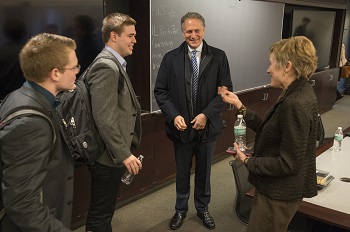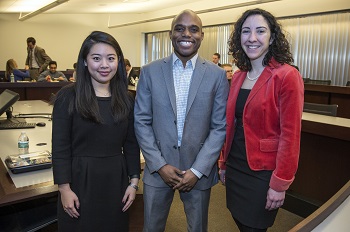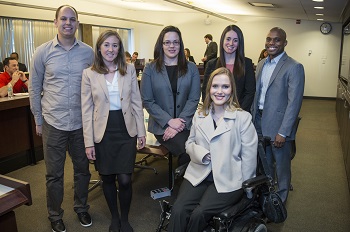The People, Paths, and Power of Doctoroff

At first, Emily Samra, ’17, was torn between business school and law school. She’d been out of college for five years, working as an insurance business analyst, and an MBA made sense. Except a JD did, too, and the insurance-industry jobs that most interested her were all held by lawyers. Unless she invested extra time and money in a joint degree, she’d have to choose. She chose law.
 But when she visited the University of Chicago Law School as an admitted student, another option emerged: just a few months before, the school had launched the certificate-granting Doctoroff Business Leadership Program. If she got in, her JD would come layered with the best of the MBA experience—an intensive core business curriculum taught by leading professors from UChicago’s Booth School of Business, as well as a summer internship, enrichment opportunities, and the guidance of a one-on-one business mentor. The program was competitive and new, and she’d have to apply, but she couldn’t help but think: this was just what she needed.
But when she visited the University of Chicago Law School as an admitted student, another option emerged: just a few months before, the school had launched the certificate-granting Doctoroff Business Leadership Program. If she got in, her JD would come layered with the best of the MBA experience—an intensive core business curriculum taught by leading professors from UChicago’s Booth School of Business, as well as a summer internship, enrichment opportunities, and the guidance of a one-on-one business mentor. The program was competitive and new, and she’d have to apply, but she couldn’t help but think: this was just what she needed.
That fall, she started at the Law School as part of the second Doctoroff class, ready to blend business and law. What she found nearly five quarters later was that the program—and its people—had also changed the way she saw the law and her future career.
“It has opened my eyes to the number of possibilities that are out there,” Samra said. “The business classes I’ve taken have given me a way of viewing the world that is both different from my law classes and relevant. I was surprised by how well they fit together. This quarter, I’m taking both Antitrust and Bankruptcy, and the Booth Business Strategy course I took last quarter has really helped connect the dots and has given me a non-legal way of thinking through the issues. It puts the law into context.”
Now in its third year, the Doctoroff program has established itself as an innovative response to a shifting world in which the divide between business and law is dissolving and the demand for lawyers with financial and corporate savvy is rising. The 38 students in the program are building an arsenal of business knowledge during their internships and through rigorous Booth classes, which are taught at the Law School and open to all students. But they’re gaining something else, too—something less tangible but equally powerful: a framework of relationships with mentors, summer bosses, and each other that has expanded their options, fueled their learning, and bolstered their ability to move fluidly among different work environments.
“The Law School tells us from Day One how important networking is, but I have been constantly surprised through Doctoroff how true that is,” Samra said. “I think the connections that come through Doctoroff will open doors for me that I didn’t know were there to be opened.”
 It is impossible to fully measure the impact of these relationships—the first Doctoroff class will graduate this spring—but anecdotal evidence suggests potent advantages: students describe On-Campus Interviewing experiences that were strengthened by regular one-on-one chats with mentors, work experiences that taught them to communicate as well with business executives as they do with lawyers, and tight-knit bonds with their Doctoroff classmates that have given them a foundation of support.
It is impossible to fully measure the impact of these relationships—the first Doctoroff class will graduate this spring—but anecdotal evidence suggests potent advantages: students describe On-Campus Interviewing experiences that were strengthened by regular one-on-one chats with mentors, work experiences that taught them to communicate as well with business executives as they do with lawyers, and tight-knit bonds with their Doctoroff classmates that have given them a foundation of support.
“This may be a success metric that we look to in the future,” said Robin Ross, Doctoroff’s Executive Director. “This program is an opportunity to create a pipeline of future resilient and remarkable business leaders—people who stay connected to each other, support and celebrate each other’s achievements, and remain connected to the Law School. That network, which includes not just the students but their mentors and the people who host them for business internships, is incredibly valuable—and it will grow over time.”
That was part of the plan when the program launched in 2013 thanks to a $5 million gift from Daniel Doctoroff, who was then the CEO of Bloomberg and is now the CEO of Sidewalk Labs, and his wife, Alisa Robbins Doctoroff, the president of UJA-Federation of New York. From the beginning, Faculty Director Douglas G. Baird, the Harry A. Bigelow Distinguished Service Professor of Law, set a tone of collegiality and curiosity, encouraging students to make the most of their experiences and opportunities.
“That first year, being a part of Doctoroff was like being a part of a startup—nobody knew how it was going to work—but Professor Baird was always there, talking to us about classes, or introducing us to people he thought would be helpful,” said Darell Hayes, ’16. “He really was, and is, the grand mentor. He reminds us that even though we’re part of Doctoroff, we’re also part of the larger Law School community. If we’re interested in philosophy, he says, we shouldn’t be afraid to take a philosophy class. That’s just a really great touch.”
Baird’s long-term vision for Doctoroff is of a program that nestles snuggly into the broader Law School experience, offering an additional layer for students planning to pursue business-related careers but also giving students new ways to connect the dots among different disciplines. And with a basic structure in place, a growing stable of relationships, and strong early feedback, Doctoroff is well on its way, he added.
“We are only in our third year, but we are on the path to developing a distinctive identity and becoming an important jewel in the Law School. At the same time, Doctoroff students are still fully connected with the rest of the Law School and take advantage of everything it has to offer,” Baird said.
Samra particularly felt the power of her Doctoroff relationships last summer, both while building her skills during an internship at litigation finance company Gerchen Keller Capital and while talking to her Doctoroff mentor—David Greenberg, ’81, Executive Vice President of LRN Corporation—throughout On-Campus Interviewing.
“Everyone was giving me advice on OCI, but David was a sounding board, helping me figure out what I wanted—not what other people thought I should want, or what they would have wanted in my situation,” Samra said. “It really helped me filter out the noise.”
When Samra found herself with multiple callbacks, Greenberg helped her develop a framework for effectively weighing her options.
“In a way, I guess I didn’t know how to be successful,” Samra said. “And he gave me advice—this is how you carry yourself when you’re doing well, you don’t need to take the first thing that’s offered. He helped me figure out what questions to ask. It started with considering what kind of lawyer I wanted to be. It was incredibly helpful.”
When it came time to choose among offers, he pushed her to compare by asking how each one stacked up against her first—and eventually final—choice, Wachtell, Lipton, Rosen & Katz.
“The most striking thing about it was that David didn’t have a dog in the fight—he was truly objective,” Samra said. “I really needed that.”
Amanda Ng, ’17, had a similar experience with her mentor, Bethany Lampland, ’03, the Chief Operating Office of the New York Foundling, a non-profit that provides services to empower disadvantaged children and families.
“She was a big part of the process,” Ng said, noting that her internship supervisor at Cantor Fitzgerald also offered regular and valuable insights.
Lampland guided Ng through the OCI process, remaining objective so Ng could make her own choice. “She told me that it was important to find people I clicked with, people I wanted to work for, people with whom I wanted to create lasting relationships,” Ng said. “She told me to go with my gut and to choose the firm that I liked best.”
When Ng had narrowed her final decision down to three firms, Lampland suggested that she think about three things: the practice group she’d be working for, the firm culture, and access to mentors.
“Then she told me to make a decision one night and go to sleep,” Ng said. “In the morning, she said I should think about whether I felt satisfied or whether I thought I’d made the wrong choice.”
It worked. Ng accepted an offer from Simpson Thacher & Bartlett.
Students also learn from their summer colleagues, gaining valuable insights on culture and, often, learning how to communicate effectively in both business and legal sides of a company.
 “It is important to be able to speak to people in their language,” Hayes said. “There’s a way that lawyers talk to each other, and there’s a way business people talk to each other. They are often concerned with different sets of problems. Lawyers can either derail a conversation or really move it along, depending on how well they communicate.”
“It is important to be able to speak to people in their language,” Hayes said. “There’s a way that lawyers talk to each other, and there’s a way business people talk to each other. They are often concerned with different sets of problems. Lawyers can either derail a conversation or really move it along, depending on how well they communicate.”
During his internship at United Airlines, Hayes spent half his time on the legal side, focusing on corporate finance, working on lending documents, and learning how an internal legal team works—and half his time on the business side, working on marketing, analytics, and business strategy with the company’s MileagePlus loyalty program.
“It was really interesting to work with non-lawyers, seeing how they view the contracts and the deals,” he said. “It was important to blend the two—it allowed me to add more color around how to think about some of these issues.”
The result, he found, was a more nuanced perspective—an asset that he hopes will lead him to have a long and varied career.
This, too, was a common theme among Doctoroff students—a willingness to think broadly about their careers. And because so many think broadly, few seem to want exactly the same trajectory.
“None of us within the Doctoroff cohort really wants the exact same career, so it is really interesting to talk about that,” Ng said. “And it is also nice to go through these classes together, especially because many Booth classes include a lot of group work. It’s nice to know that you have a group of people you work well with who are following you through all these classes.”
For many, their Doctoroff cohort represents the beginning of a valuable support network.
“I’ve become really close with a lot of the people in the program. I’ve taken classes with them, and we’ve gone through the experience together,” Hayes said. “Even though we may not always talk, I feel like I have this fellowship—I can reach out to people who I know are competent and smart and have my best interests at heart. It’s powerful to be a part of that.”